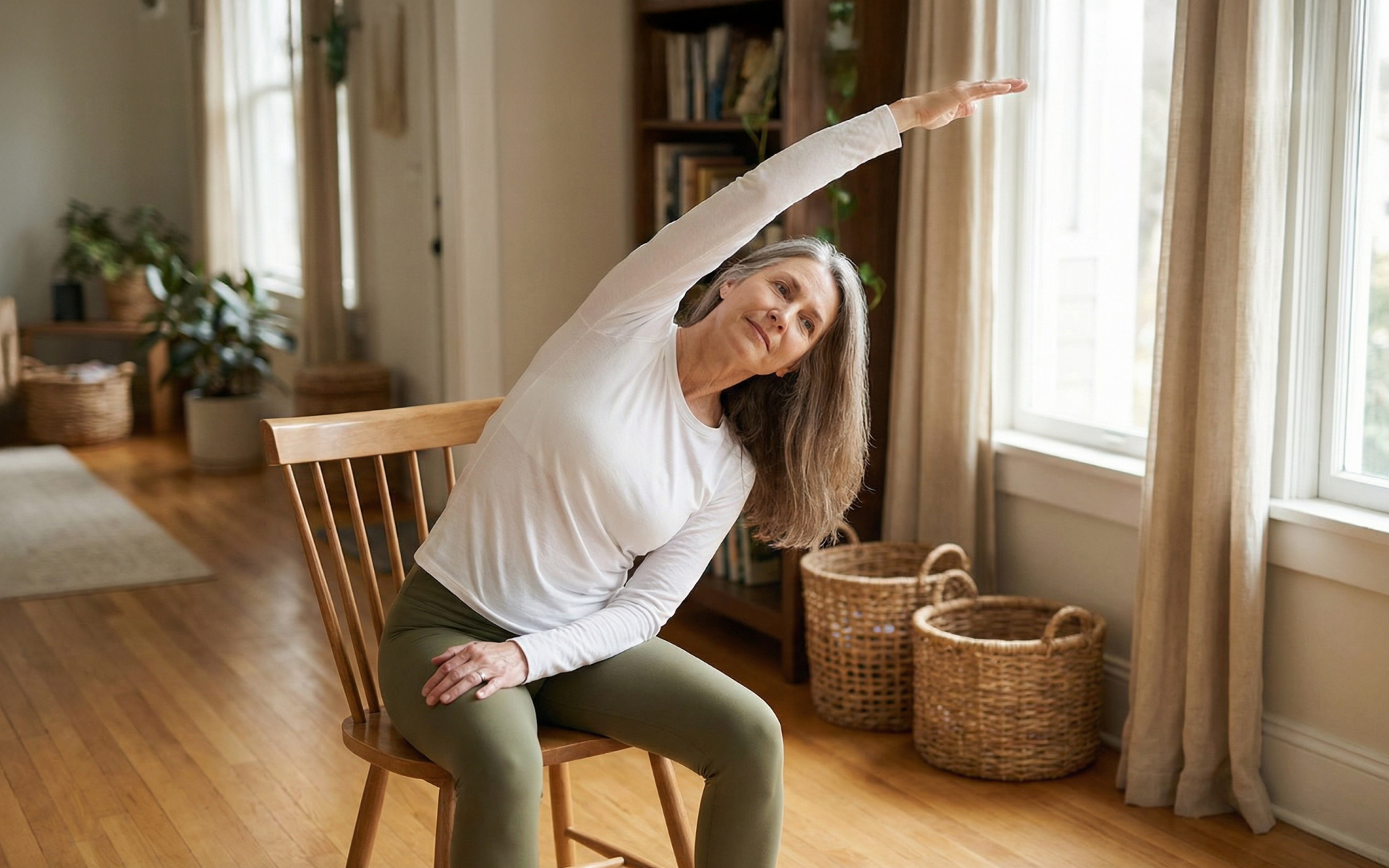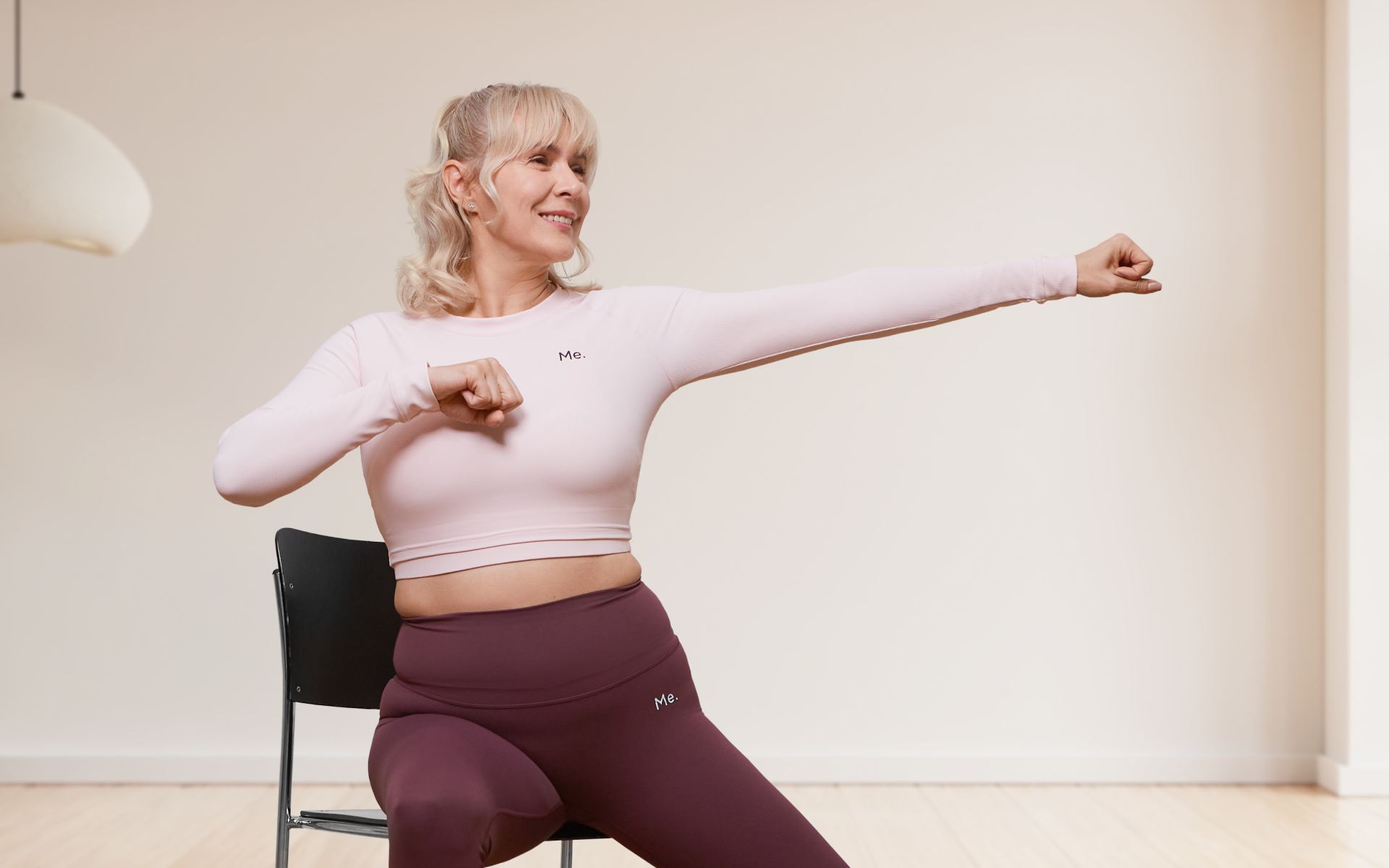Do chair yoga poses for balance really work? Balance becomes tricky as you age, and the risk of falling or injuring yourself increases every year. You desperately need balancing exercises you can do without adding to your risks, or you simply want to start yoga as a beginner.
Fortunately, our chair yoga poses for balance guide will offer the answers you need. Chair yoga can improve more than just your balance and it can be a far safer option for seniors or those who are recovering from injuries than a traditional yoga workout. Let’s show you the top chair yoga poses for balance.
Can Chair Yoga Help with Balance?
Chair yoga poses for balance are genuine and you may benefit from the following while doing some balancing poses on a chair:
- Improved balance (2, 8, 7, 13)
- Enhanced posture (8)
- Improved flexibility (7)
- Reduced risk of falling (13)
- Improved range of motion (13)
- Enhanced core strength and functional fitness (10, 5)
- Reduced joint pain (6, 1)
Let’s now dive deeper into the facts and best chair yoga poses for balance.
Does Yoga Train Balance?
An early systematic review by Johns Hopkins University found yoga could improve balance (2). However, researchers noted that poor study design and quality may have obscured the results. Fortunately, some later studies have confirmed that yoga may improve balance.
One small Brazilian study found that five months of hatha yoga significantly improved posture and balance in healthy adults (8). Another small study in Bangladesh found yoga improved balance and flexibility (7). Only 20 athletes took part in this study.
Furthermore, a study at North-Eastern Illinois University also found that yoga could improve flexibility and balance among young athletes (9). More importantly, an American Journal of Occupational Therapy systematic review found yoga could improve balance and range of motion in seniors (13).
The senior population is at the greatest risk of falls and injuries due to neuromuscular impairment. Fortunately, the last review found sufficient evidence that yoga could improve the factors that cause higher fall risks and balance issues in elderly people.
If you struggle to even flirt with the idea of giving up your favorite foods or working out till your legs give way – BetterMe app is here to breathe a fresh perspective into the way you view the weight loss process! Check out the app and experience the fun side of fitness and dieting with BetterMe!
More Chair Yoga Benefits
Another systematic review by Indian researchers found yoga could enhance core muscle strength to reduce the risk of injuries and improve the management of lower-back pain (10). Better posture, core strength, and flexibility could also help you balance yourself.
In addition, a small chair yoga study found that it improves strength and functional fitness (5). Another small Taiwanese study found that chair yoga helped people with arthritis reduce joint pain (6). Finally, another small study confirmed chair yoga reduced pain related to osteoarthritis (1).
What Is the Chair Pose Good for in Yoga?
The chair pose is different from chair yoga. The benefits of the chair pose in yoga include functional fitness, musculoskeletal strengthening, balance, and increased stamina (3). It could also improve your spatial awareness (proprioception) and help enhance the range of motion in your knees.
What Yoga Poses Improve Balance?
Various yoga poses improve balance. Let’s show you the ultimate list of chair yoga poses for balance to ensure you have the tools you need to be as healthy as you want to be for as long as possible.
3 Chair Yoga Poses for Balance (Beginners)
The best chair yoga poses for balance start with a beginner’s list. Improving balance is definite (2, 8, 7, 13). However, you should be cautious when completing these exercises and speak with a medical professional to ensure your body can handle these movements. It’s advised to skip these as a senior who must avoid specific poses with extreme bends and twists (11).
Chair Spinal Twist
- Sit sideways in the chair with your knees over its left arm and your left arm over its back
- Keep your back straight and your body away from the chair
- Hold the back of the chair with both hands as you inhale deeply
- Slowly turn your body toward the back of the chair as you exhale
- Release and repeat
Crow Pose
- Sit on the edge of the chair with a supportive surface in front of the chair
- Lean forward as you inhale, grabbing the surface with both hands
- Press your arms against your inner thighs
- Hold the pose for several breaths
- Release and repeat
Down Dog
- Face the base of your while chair standing
- Inhale and lift your arms overhead
- Exhale as you rest your hands on the base of the chair
- Bend your knees if necessary
- Walk backward slowly while lifting your hips
- Hold the pose for several deep breaths
- Release and repeat
Read more: 21 Day Chair Yoga: Reasons To Add This Challenge To Your Routine
12 Chair Yoga Poses for Older Adults
Chair yoga poses for seniors must be gentle enough on your joints and avoid the risk of injury. Extreme twists and bends aren’t recommended for anyone with osteoporosis (11). Let’s cover the gentlest chair yoga poses you can use for balance. As with the exercises above, you should consult a medical professional to ensure your body can handle these movements.
Cat-Cow
- Sit on the edge of the chair with your back straight
- Gently arch your back slightly as you inhale
- Get into the cow position, but only until you feel some tension without pain
- Hold the pose for 3-5 deep breaths
- Return your arched back and bend gently into the cat position
- Hold your shoulders over your hips as you breathe deeply
- Release and repeat
Chair Pigeon
- Sit straight with your back away from the chair
- Gently raise your right ankle to rest on your left knee
- Inhale deeply as you slightly flex your foot
- Bend a little forward as you exhale
- Hold the pose for a few deep breaths
- Release and repeat
Chair Warrior
- Sit straight with your arms at a wide and low angle by your sides
- Inhale deeply as you raise your arms overhead
- Touch your knees together and arch your back slightly
- Hold the pose for a few deep breaths
- Release and repeat
Eagle Arms
- Sit straight and stretch your arms out in front of you
- Cross your right arm over your left arm
- Bend your elbows to bring the forearms together
- Interlace your fingers while bringing your elbows slightly higher
- Arch your back a little and breathe deeply a few times
- Release and repeat
Foot-to-Seat Pose
- Stand facing the side of the chair
- Grab the back of the chair with one hand and step onto the chair with the other foot
- Raise your free hand overhead as you inhale
- Hold the chair for support as you hold the pose for several breaths
- Release and repeat on both sides
Gluteal Stretch
- Sit straight with your left ankle resting on your right thigh
- Hinge your hips as you gently bend your chest toward the floor
- Only lower yourself as comfortably as possible without causing pain
- Hold the stretch with your glutes and thighs feeling the pull
- Release and repeat on both sides
Neck Stretch
- Sit straight without touching your back to the chair
- Extend your neck slowly upward while inhaling
- Hold the base of your chair with one hand while extending the other upward
- Gently dip the ear on the same side as your upward arm to your shoulder as you breathe out
- Keep your back straight and reverse
- Repeat on both sides
Overhead Stretch
- Sit with your arms down by your sides
- Breathe in deeply as you raise your arms overhead
- Hold your arms up for 30 seconds
- Breathe out slowly as you bring your arms back, and repeat
Quad Stretch
- Kneel on a chair with one leg as you stand facing it
- Pull your left heel with your right hand
- Pull it toward your butt as you straighten the hips
- Hold the pose for several breaths and repeat on both sides
Whether you’re a workout beast or just a beginner making your first foray into the world of fitness and dieting – BetterMe has a lot to offer to both newbies and experts! Install the app andexperience the versatility first-hand d!
Reverse Arm Hold
- Sit straight with your back away from the chair
- Inhale deeply as you reach your arms straight out to your sides
- Exhale as you slowly reach your hands behind your back
- Bend your elbows and arch your back slightly
- Release and repeat
Seated Forward Bend
- Sit straight with your knees touching and your feet grounded
- Inhale deeply and as you exhale, bend over slightly
- Lean forward until you feel tension but no pain
- Hold the pose for a few deep breaths
- Release and repeat
Seated Mountain
- Sit on the front half of your chair
- Keep your core engaged and your back straight
- Bend your knees to 90 degrees with a small space between them
- Move your ankles underneath the chair
- Inhale and exhale as you gently bend slightly forward as far as is comfortable
- Hold your arms up at your sides
- Hold the pose for several breaths and repeat
Read more: Unlocking Relaxation: The Magic of Restorative Chair Yoga
3 Chair Yoga Poses for Balance and Strength
Chair yoga strengthening exercises can help seniors and anyone who is recovering from an injury benefit from more than improved balance. Remember to listen to your body and avoid too much bending or twisting as a senior (11). However, one of the pillars for developing functional strength comes from stretching your muscles over time. (10).
Helicopter Pose
- Sit straight with your arms resting on your hips
- Spread your knees slightly apart as you fold your hips to the right
- Keep your back straight as you slowly return and repeat on the other side
Palm Tree
- Stand facing the back of the chair
- Hold the back of the chair as you rise to the balls of your feet
- Lift one arm overhead as you inhale
- Hold the pose for several breaths
- Release and repeat
Tree Pose
- Stand with your hips next to the back of the chair
- Grab the chair with the closest hand to support yourself
- Raise the leg furthest from the chair to rest on your calf
- Raise the same hand overhead
- Hold the pose for a few deep breaths
- Release and repeat on both sides.
For more chair yoga reading:
FAQs
Does chair yoga count as exercise?
Exercise is a broad spectrum. Harvard has reviewed several papers to confirm that any exercise is better than doing nothing and staying sedentary (12). Chair yoga may not be on the more active spectrum of exercise, but any exercise you can do to stop being sedentary has benefits.
Is it OK to do chair yoga every day?
The recommendation is a minimum of 2-3 times weekly (4). However, gentle stretching that doesn’t place strain on your joints and overwork your muscles will most likely not harm you if you do it daily. You could actually gain a healthier relationship with your body and potentially develop functional strength.
Can you do yoga if you have bad balance?
You could improve your balance with yoga if you have neuromuscular impairment that causes balance problems. An American Journal of Occupational Therapy systematic review found yoga could improve balance and range of motion in seniors with neuromuscular impairment that increases the risk of injury and falls (13).
How many times a week should you do chair yoga?
The American College of Sports Medicine recommends any form of stretching at least 2-3 times weekly (4). They also recommend holding each stretch for at least 15-30 seconds and repeating them 3-4 times per workout.
The Bottom Line
Chair yoga poses for balance may set you up for greater functional fitness capabilities, improve your balance, and provide more benefits than you could ever achieve by remaining sedentary. Start your chair yoga routine today to discover optimal balance, flexibility, and range of motion.
DISCLAIMER:
This article is intended for general informational purposes only and does not serve to address individual circumstances. It is not a substitute for professional advice or help and should not be relied on for making any kind of decision-making. Any action taken as a direct or indirect result of the information in this article is entirely at your own risk and is your sole responsibility.
BetterMe, its content staff, and its medical advisors accept no responsibility for inaccuracies, errors, misstatements, inconsistencies, or omissions and specifically disclaim any liability, loss or risk, personal, professional or otherwise, which may be incurred as a consequence, directly or indirectly, of the use and/or application of any content.
You should always seek the advice of your physician or other qualified health provider with any questions you may have regarding a medical condition or your specific situation. Never disregard professional medical advice or delay seeking it because of BetterMe content. If you suspect or think you may have a medical emergency, call your doctor.
SOURCES:
- A Pilot Randomized Controlled Trial of the Effects of Chair Yoga on Pain and Physical Function Among Community-Dwelling Older Adults With Lower Extremity Osteoarthritis (2016, agsjournals.onlinelibrary.wiley.com)
- A Systematic Review of Yoga for Balance in a Healthy Population (2014, ncbi.nlm.nih.gov)
- Benefits of Utkatasana (Chair Pose), and How to Do it By Dr. Himani Bisht (2024, pharmeasy.in)
- Current Concepts in Muscle Stretching for Exercise and Rehabilitation (2012, ncbi.nlm.nih.gov)
- Effectiveness of Chair Yoga for Improving the Functional Fitness and Well-being of Female Community-Dwelling Older Adults With Low Physical Activities (2019, journals.lww.com)
- Effect of Chair Yoga Therapy on Functional Fitness and Daily Life Activities among Older Female Adults with Knee Osteoarthritis in Taiwan: A Quasi-Experimental Study (2023, ncbi.nlm.nih.gov)
- Effects of Yoga on Flexibility and Balance: A Quasi-Experimental Study (2017, researchgate.net)
- Hatha Yoga on Body Balance – PMC (2014, ncbi.nlm.nih.gov)
- Impact of 10-Weeks of Yoga Practice on Flexibility and Balance of College Athletes (2016, ncbi.nlm.nih.gov)
- (PDF) A Comprehensive Review of Yoga and Core Strength: Strengthening Core Muscles as Important Method for Injury Prevention (Lower Back Pain) and Performance Enhancement in Sports (2018, researchgate.net)
- Osteoporosis – Safe Yoga Poses (n.d., yogaanytime.com)
- Some Exercise Beats None; More Is Better – Harvard Health (2015, health.harvard.edu)
- Systematic Review of Yoga and Balance: Effect on Adults With Neuromuscular Impairment (2019, researchgate.net)










